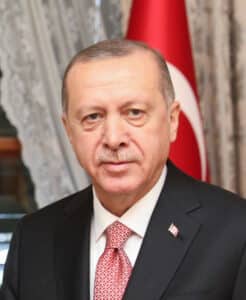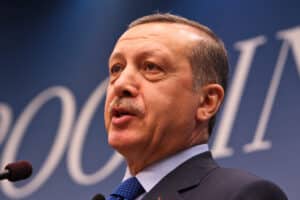Egyptian President Abdul Fatah al-Sisi in 2017
In a statement, the Egyptian presidency has emphasized a new beginning in relations with Turkey. During an encounter in Doha at the opening of the World Championship, Egyptian President Abdel Fatah al-Sisi and Turkish President Recep Tayyip Erdogan shook hands and recognized “the depth of historical ties between the two countries.” The statement indicates that the countries are willing to resolve their almost decade-long breach.
Although Turkish officials have been changing their rhetoric on Egypt for some time now, Cairo kept insisting that little had changed between the two countries. Now, Cairo’s attitude appears to have shifted.
Muslim Brotherhood
Relations between the two countries soured in 2013, when al-Sisi ousted the regime of democratically elected Mohamed Morsi, leader of the Muslim Brotherhood – a move opposed by Erdogan. Al-Sisi subsequently prohibited the Muslim Brotherhood Party and members have been subjected to harsh oppression ever since. Turkey has offered refuge to Egyptian Muslim Brotherhood members and opposition activists that fled the country. Economic relations between Turkey and Egypt have nonetheless flourished over the past decade.
Although Turkey has offered refuge to members of the Muslim Brotherhood, the Islamist movement is quite different from Erdogan’s Justice and Development Party (AKP). There are ideological similarities, but the parties diverge on some core issues, such as their outlook on secularism and the state.
“Nothing to do with democracy”
An Al Jazeera interview with President Erdogan in 2016 was emblematic of the strained relations between the two countries of the past decade. In the interview, Erdogan argued that “President al-Sisi has nothing to do with democracy, and that he’s killed thousands of his own people.” Erdogan’s statements on al-Sisi were condemned by Egyptian officials.
Last year, however, Egypt and Turkey held their first diplomatic meeting in years. In addition, Erdogan forced popular Egyptian talk show hosts Moataz Matar and Mohammed Nasser, living in Turkey in exile, to temper their criticism on President al-Sisi. Also, this month, Turkish security forces arrested an exiled Egyptian activist.
Geopolitical and national motives
Ankara is leading the way in the breakthrough between the two countries, motivated by several geopolitical factors. Since the presidency of Donald Trump has come to an end, relations between the US and Turkey have become increasingly strained. To this background of Washington/Ankara tensions, the rift with Cairo is not particularly advantageous to Turkey. In addition, Turkey is confronted with a new regional alliance of Cyprus, Egypt, Greece, and Israel. Ankara’s reaching out to members of the alignment may harm the cohesion of the bloc, which would strengthen Turkey’s regional position.
Cairo also has its motives to be seeking closer relations with Ankara. First, it might be wanting the clamping down of Muslim Brotherhood (media) activity in Turkey. Moreover, it might seek extradition of Egyptian exiled dissidents, who committed violence in Egypt.
Libyan conflict
The opposing interests of the two countries in the Libyan conflict may proof to be a hurdle in the normalization of relations. Egypt and Turkey support opposing sides in the conflict. Egypt backs the eastern-based Libyan National Forces (LNA) of military commander Khalifa Haftar, while Turkey supports the Tripoli-based Government of National Accord (GNA).
Sources: Arab Center Washington DC, Carnegie Endowment, Al Jazeera, Middle East Eye, Al-Monitor 1, Al-Monitor 2
Photo: Wikimedia Commons



